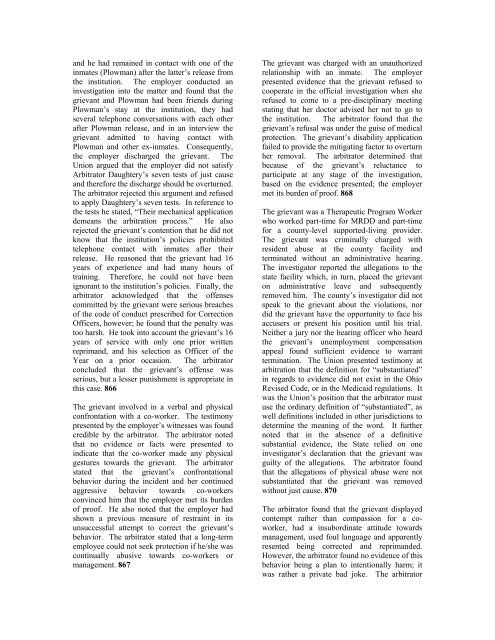by Contract Number (PDF) - OCSEA
by Contract Number (PDF) - OCSEA
by Contract Number (PDF) - OCSEA
Create successful ePaper yourself
Turn your PDF publications into a flip-book with our unique Google optimized e-Paper software.
and he had remained in contact with one of the<br />
inmates (Plowman) after the latter’s release from<br />
the institution. The employer conducted an<br />
investigation into the matter and found that the<br />
grievant and Plowman had been friends during<br />
Plowman’s stay at the institution, they had<br />
several telephone conversations with each other<br />
after Plowman release, and in an interview the<br />
grievant admitted to having contact with<br />
Plowman and other ex-inmates. Consequently,<br />
the employer discharged the grievant. The<br />
Union argued that the employer did not satisfy<br />
Arbitrator Daughtery’s seven tests of just cause<br />
and therefore the discharge should be overturned.<br />
The arbitrator rejected this argument and refused<br />
to apply Daughtery’s seven tests. In reference to<br />
the tests he stated, “Their mechanical application<br />
demeans the arbitration process.” He also<br />
rejected the grievant’s contention that he did not<br />
know that the institution’s policies prohibited<br />
telephone contact with inmates after their<br />
release. He reasoned that the grievant had 16<br />
years of experience and had many hours of<br />
training. Therefore, he could not have been<br />
ignorant to the institution’s policies. Finally, the<br />
arbitrator acknowledged that the offenses<br />
committed <strong>by</strong> the grievant were serious breaches<br />
of the code of conduct prescribed for Correction<br />
Officers, however; he found that the penalty was<br />
too harsh. He took into account the grievant’s 16<br />
years of service with only one prior written<br />
reprimand, and his selection as Officer of the<br />
Year on a prior occasion. The arbitrator<br />
concluded that the grievant’s offense was<br />
serious, but a lesser punishment is appropriate in<br />
this case. 866<br />
The grievant involved in a verbal and physical<br />
confrontation with a co-worker. The testimony<br />
presented <strong>by</strong> the employer’s witnesses was found<br />
credible <strong>by</strong> the arbitrator. The arbitrator noted<br />
that no evidence or facts were presented to<br />
indicate that the co-worker made any physical<br />
gestures towards the grievant. The arbitrator<br />
stated that the grievant’s confrontational<br />
behavior during the incident and her continued<br />
aggressive behavior towards co-workers<br />
convinced him that the employer met its burden<br />
of proof. He also noted that the employer had<br />
shown a previous measure of restraint in its<br />
unsuccessful attempt to correct the grievant’s<br />
behavior. The arbitrator stated that a long-term<br />
employee could not seek protection if he/she was<br />
continually abusive towards co-workers or<br />
management. 867<br />
The grievant was charged with an unauthorized<br />
relationship with an inmate. The employer<br />
presented evidence that the grievant refused to<br />
cooperate in the official investigation when she<br />
refused to come to a pre-disciplinary meeting<br />
stating that her doctor advised her not to go to<br />
the institution. The arbitrator found that the<br />
grievant’s refusal was under the guise of medical<br />
protection. The grievant’s disability application<br />
failed to provide the mitigating factor to overturn<br />
her removal. The arbitrator determined that<br />
because of the grievant’s reluctance to<br />
participate at any stage of the investigation,<br />
based on the evidence presented; the employer<br />
met its burden of proof. 868<br />
The grievant was a Therapeutic Program Worker<br />
who worked part-time for MRDD and part-time<br />
for a county-level supported-living provider.<br />
The grievant was criminally charged with<br />
resident abuse at the county facility and<br />
terminated without an administrative hearing.<br />
The investigator reported the allegations to the<br />
state facility which, in turn, placed the grievant<br />
on administrative leave and subsequently<br />
removed him. The county’s investigator did not<br />
speak to the grievant about the violations, nor<br />
did the grievant have the opportunity to face his<br />
accusers or present his position until his trial.<br />
Neither a jury nor the hearing officer who heard<br />
the grievant’s unemployment compensation<br />
appeal found sufficient evidence to warrant<br />
termination. The Union presented testimony at<br />
arbitration that the definition for “substantiated”<br />
in regards to evidence did not exist in the Ohio<br />
Revised Code, or in the Medicaid regulations. It<br />
was the Union’s position that the arbitrator must<br />
use the ordinary definition of “substantiated”, as<br />
well definitions included in other jurisdictions to<br />
determine the meaning of the word. It further<br />
noted that in the absence of a definitive<br />
substantial evidence, the State relied on one<br />
investigator’s declaration that the grievant was<br />
guilty of the allegations. The arbitrator found<br />
that the allegations of physical abuse were not<br />
substantiated that the grievant was removed<br />
without just cause. 870<br />
The arbitrator found that the grievant displayed<br />
contempt rather than compassion for a coworker,<br />
had a insubordinate attitude towards<br />
management, used foul language and apparently<br />
resented being corrected and reprimanded.<br />
However, the arbitrator found no evidence of this<br />
behavior being a plan to intentionally harm; it<br />
was rather a private bad joke. The arbitrator
















